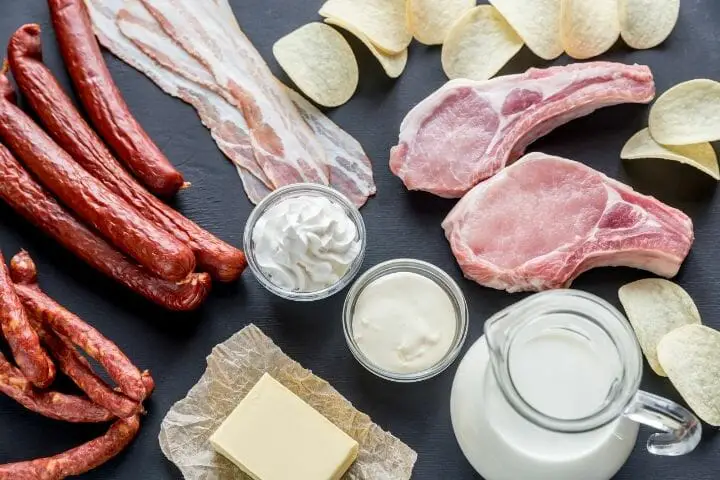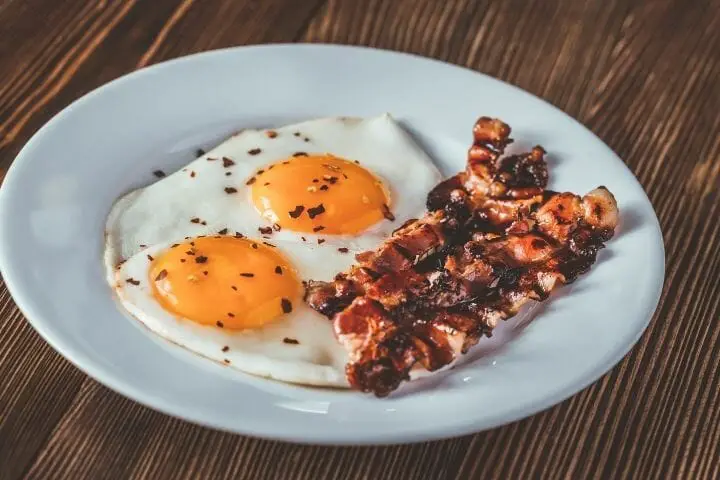All saturated fats are not bad for your body. Let’s find out which saturated foods are good for health in this article.
Contents
You are always warned not to eat saturated fats in your diet and replace them with unsaturated fats like nuts, seeds, fish, and vegetable oil.
But new research questions this belief. Researchers studied the relationship between saturated fatty acids and coronary disease in almost 400,000 people. They didn’t find any significant evidence that shows that saturated fats increase the risk of heart diseases. Therefore, saturated fats are harmless as far as heart health is concerned.

Saturated fats are not a single nutrient but a combination of different fatty acids, which has a varying effect on your health and metabolism. However, according to the American Heart Association, eating saturated fat in large quantities increases the risk of coronary disease.
This article discusses dietary fats and which saturated fats are good for health below. So you can continue reading the whole article for more information.
You might like to read: Quick and Easy Healthy Meals to Prepare for Seniors
Types Of Fat
Conventional wisdom tells you to avoid fat in your meals because it increases your waistline. Consequently, many people have switched to low-fat foods in recent years. But shifting to low-fat foods does not necessarily make you healthier because you cut down both healthy fat and harmful fats.
Fat is a type of nutrient like proteins and carbohydrates that your body needs daily. It is a significant source of energy and helps absorb some vitamins and minerals. Fats are essential in building the cell membrane and sheaths surrounding the nerves.
Fats help in clotting your blood, movement of muscles and inflammation. But remember eating too much fat in your diet can increase the risk of heart disease and obesity.
All fats have almost the same chemical structure, i.e., a chain of carbon atoms is bonded to the hydrogen atoms. But the length and shape of the carbon chain or the number of hydrogen atoms linked with carbon atoms make one fat different from each other. There are mainly three types of fat, i.e., saturated fat, unsaturated fat, and trans-fat.

#1. Bad Trans Fats
Bad trans fats are trans-unsaturated fatty acids or trans-fatty acids, the worst type of dietary fats. These fats are available in both natural and artificial forms.
The natural form of trans fats is found in meat and dairy animals like goats and sheep and forms when bacteria in the stomach of these animals digest grass.
Several researchers have concluded taking a moderate amount of natural trans fats is not harmful to health. The best natural trans-fat is Conjugated Linoleic acid(CLA), found in dairy fat and vegetable oil. The CLA is primarily a type of polyunsaturated omega-six fatty acids.
Artificial trans fats or partially hydrogenated fats are not suitable for your health. These fats form when hydrogen is added to the liquid vegetable oils to make them more solid.
Artificial trans fats increase the risk of heart diseases, stroke, and Type 2 diabetes. Studies show that trans fats raise LDL(bad) cholesterol instead of HDL(good )cholesterol. In the United States, the Food and Drug Administration has banned trans fats in commercially prepared food, and the World Health Organization has instructed all over the World not to use trans fats by 2023.
I am listing below some examples of artificial trans fats
- Microwave popcorn
- Frozen pizza
- Fried foods
- Baked food like cake
- Refrigerated dough like biscuits, rolls

#2. Unsaturated Fats
Unsaturated fats are healthy fats and are found in loose-packed goods. These fats are liquid at room temperature. There are mainly two types of saturated fats.
Monounsaturated Fats
Monounsaturated fats help grow and maintain the cell. Simultaneously, it lowers LDL(bad cholesterol). Cholesterol is a soft waxy substance that can clog arteries. Lowering the LDL value can decrease the risk of heart disease and heart attack.
I am listing below a few foods that are rich in monounsaturated fats.
- Olive oil
- Peanut oil
- Avocados
- Nuts
Polyunsaturated fats
Your body needs polyunsaturated fats for proper function, blood clotting, and growth of the muscles. Your body does produce polyunsaturated fats on its own. So you have to take polyunsaturated fats from outside, i.e., through your diet.
Polyunsaturated fats are mainly of two types, i.e., omega-three and omega-six fatty acids.
The best sources of omega-three fatty acids are as follows
- Fatty fish
- Oyster
- Walnut
- Chia seeds
The best sources of omega-six fatty acids are as follows
- Canola oil
- Corn oil
- Walnut oil
- Sunflower oil
#3. Saturated Fats
Saturated fats have a single bond between their carbon molecules and are saturated with hydrogen. These fats are solid at room temperature. There are different types of saturated fat depending on their carbon chain.
The carbon chain can be short, long, medium, and extremely long-chain fatty acids, and each chain has a different impact on the health of your body.
You have mainly two kinds of cholesterol in your blood, i.e., good (HDL) and bad(LDL) cholesterol. Saturated fats are generally believed to increase bad cholesterol. But that is just one part of the story. There are mainly two kinds of LDL or bad cholesterol. Type one is big floaty particles, and type 2 is small dense ones.
When you reduce the intake of saturated fat, their LDL cholesterol reduces, and hence there is a reduction in type one particles. But now, what about type two particles? They are the leading cause of heart disease and can be controlled only by taking a low amount of carbohydrates.
So now, many researchers say that the best way to reduce the harmful effects of cholesterol and coronary disease is by taking a diet that is low in carbohydrates and not fat.

Type Of Saturated Fatty Acids
The most common type of saturated fatty acids found in the diet is as follows
#1. Stearic acid(18 Carbon Atoms)
Stearic acid is the most common saturated fat in Americans’ diet and is considered one of the healthy saturated fats. According to some researchers, stearic acids help lower the LDL(bad cholesterol) level slightly, which has a significant impact on your body’s health. Your body partly converts stearic acid into oleic acid, a healthy unsaturated fat.
The primary source of stearic acid is animal fat, i.e., meat. The levels are usually low in plant fat except for coconut oil, palm kernel oil.
#2.Palmitic Acid(16 Carbon Atoms)
Palmitic acid is mainly present in palm oil. However, a quarter of the fat in red meat and dairy products contains palmitic acid.
#3. Myristic Acid(14 Carbon Atoms)
Myristic acid causes a much more substantial increase in your total cholesterol and LDL(bad cholesterol) than palmitic acid. However, it does not affect HDL (good cholesterol).
It is a rare fatty acid and is not found in most foods. You will find a high amount of myristic acid in cow milk and dairy products
#4. Lauric Acid(12 Carbon Atoms)
Lauric acid increases HDL cholesterol, which is good for the health of your heart. It is present in coconut oil and palm kernel oil.
#5. Capric, Caprylic, And Capric Acid
Capric, Caprylic, and capric acid are medium-chain fatty acids that help lose weight, increase insulin sensitivity, and reduce the risk of seizures.

Why Are Saturated Fats Good For You?
Saturated fats have many positive effects on your body. I am listing some of them below.
- Saturated fats help in improving the function of your liver.
- The saturated fatty acids mainly present in butter and coconut helps the white blood cells in your body to destroy invading viruses and bacteria.
- Saturated fats help repair tissue, preserve muscle, and improve sexual function.
Which Saturated Foods Are Good For My Health?
#1. Red Meat
Beef, lamb, and pork are high in saturated fat. In every lean cut of beef, there are 4.5 grams of saturated fat per 100 grams of serving.
The researchers from the Harvard School of Public Health analyzed the diets of almost 1.2 million people and found that there is a link between red meat and coronary disease. You may have heart problems if you prefer to eat processed meat.
#2. Cheese
Cheese is highly beneficial to your body. It is rich in calcium, vitamin B12, phosphorus, selenium, and many other nutrients.
It is even rich in protein. There are 6 grams of protein in every 28 grams of cheese. There is 64 percent saturated fat and 29 percent monounsaturated fat in regular cheese. The rest, 3 percent, is polyunsaturated fats.
#3. Whole Milk
There are 4.5 grams of saturated fat in one cup of whole milk. Additionally, it contains 7.9 grams of protein, essential for muscle growth.
Whole fat milk is rich in calcium, vitamin D, and omega-three fatty acids. The omega-three fatty acids have many health benefits as it helps improve your heart, brain health and reduce the risk of cancer.

#4. Whole Eggs
Whole eggs were earlier considered unhealthy because the yolks are high in saturated fat. But now, new studies say that fat and cholesterol present in eggs do not have an adverse effect on most people.
Again eggs are rich in vitamins and nutrients, beneficial for your health. For instance, it contains choline which is quite essential for the health of your brain. They are even rich sources of protein and are considered weight loss-friendly food.
#5. Butter
Butter is rich in saturated fat. There are nearly 7 grams of saturated fat in one tablespoon of butter. Additionally, it is rich in calcium and vitamin D, essential for strengthening bones. Butter helps in treating osteoporosis, a disease that makes your bone fragile.
It is even rich in beta carotene, which lowers the risk of lung and prostate cancer. Butter even contains vitamin E, which is good for the health of your skin.
#6. Coconut Oil
Coconut oil has a high amount of saturated fat compared to butter and beef fat. It contains almost 90 percent saturated fat, giving a firm texture at room temperature.
Fats consist of smaller molecules called fatty acids. Fortunately, coconut oil consists of different types of fatty acids. The predominant type is lauric acid, almost 47 percent of saturated fatty acids present in coconut oil.
The lauric acid increases the HDL cholesterol relative to total cholesterol, which consequently helps in reducing heart disease. However, other fatty acids like myristic acid and palmitic acid are also present in small quantities in coconut oil.
Many researchers say that regular intake of coconut oil increases the level of lipids in the blood, which helps in reducing the risk of coronary disease.
Many health experts say that coconut oil consists of medium-chain triglycerides(MCT), which are beneficial for your health. The MCT helps promote weight loss and manage epilepsy, Alzheimer’s disease, and autism.

#7.Palm Oil
There are 7 grams of saturated fat in one tablespoon(i.e., 14 grams ) of palm oil. The primary saturated fat present in palm oil is palmitic acid which contributes 44 percent calories.
Palmitic acid raises total cholesterol and LDL cholesterol levels without any effect on HDL or good cholesterol. But various researchers conclude that large LDL particles do not have a harmful impact on health.
Again, if you eat linolenic acid(unsaturated fat) and palm oil, it can reduce some effects of palmitic acid on bad cholesterol. Additionally, it contains a greater amount of oleic acid and a small amount of linoleic acid and stearic acid.
This oil is a rich source of tocotrienols, a form of vitamin E with high antioxidant properties, which is quite beneficial for the health of your brain.
It improves vitamin A in people who have a deficiency or are at the risk of having a deficiency in the future. One study found that people who have difficulty absorbing fat-soluble vitamins have increased levels of vitamin A after taking two to three spoons of red palm oil for eight weeks.
#8. Dark Chocolate
The saturated fat in dark chocolate comes from cocoa butter. Cocoa butter has equal amounts of stearic acid, palmitic, and oleic acid (a healthy monounsaturated fat).
Additionally, dark chocolate contains fiber and is a rich source of iron and magnesium and antioxidants like resveratrol which is good for your health.
But people choose dark chocolate with 70 percent cocoa because other varieties have high sugar content and are low in antioxidants and other nutrients.

#9. Full Fat Yogurt
Most of the fat in yogurt(70 percent) is saturated fat and contains a fair amount of monounsaturated fats. It is loaded with probiotics which is quite beneficial for your health. Studies related to yogurt show that it improves digestion health and reduces the risk of coronary disease.
You might like to read: How to Increase Energy Levels Among the Elderly
Wrap Up
Fats are high in calories which promotes weight gain. A per gram fat has twice more calories than proteins and carbohydrates.
Remember, saturated fats are not harmful to your health. But if you take in an increased amount, it can lead to coronary disease. You should limit your saturated fat to less than 10 percent of your total calorie intake.
But if you are a heart patient or have high cholesterol, your health care professional may advise you to take saturated fat less than 7 percent of your daily calorie intake.

However, I have listed above some foods which have high saturated fats and are beneficial for your health. Eat them in moderate quantities to remain healthy. But don’t eat processed food, hot dogs, or pizza. They are high in saturated fats but not good for your health.
We hope this article has given you helpful information, and please don’t forget to share this article with someone searching for this particular information. You can ask us queries related to saturated fats in the comment section, we will be happy to answer all of your questions.
